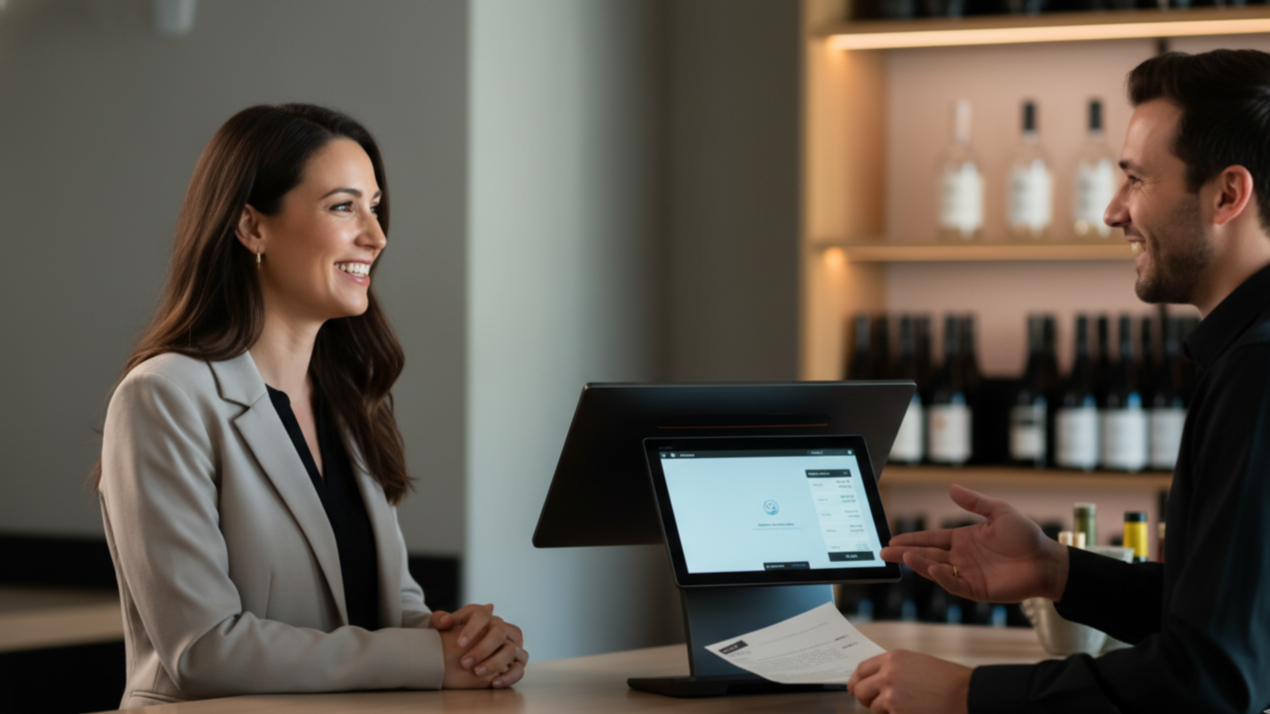
Mastering Your Restaurant Profit Percentage: A Simple Guide for Busy Owners
Running a restaurant isn’t just about serving great food. It’s also about making sure the numbers behind the scenes add up. Have you ever looked at your monthly sales and thought, “We were so busy, so why aren’t we making more money?” That’s where understanding your restaurant profit percentage comes in. It shows how much of your sales actually end up in your pocket after covering everything from food costs to utilities.
This number can tell you if your business is thriving, barely surviving, or somewhere in between. And here’s the good news: you don’t need to be an accountant to get a handle on it.
In this guide, we’ll walk you through what restaurant profit percentage means, how to calculate it in minutes, and three simple ways to improve it, without overhauling your entire business. We’ll also show you how tools like NOVA can help you stay on top of your numbers while you focus on what you do best: running your restaurant.
What Is Restaurant Profit Percentage?
Your profit percentage, also called your profit margin, is the portion of your total sales that remains after paying all your expenses. It’s a simple formula:
Profit Percentage = (Net Profit / Total Sales) * 100
Let’s break that down:
- Net Profit is what’s left after you subtract everything you spent, food, labor, rent, utilities, supplies, from your total sales.
- Total Sales is your gross revenue for a specific period, like a month or a quarter.
Quick Example
Total sales this month: $50,000
Total expenses: $45,000
Net profit = $50,000 – $45,000 = $5,000
Profit percentage = (5,000 / 50,000) * 100 = 10%
Most independent restaurants operate on razor-thin margins. Industry data shows that the average restaurant profit margin falls between 3% and 5%, though well-managed operations often reach 8% to 12% Restaurant Profit percentage. Quick-service concepts tend to achieve higher margins than full-service or fine-dining restaurants, where labor and overhead eat into profits.
If you’re consistently above 12%, you’re in excellent shape. But if your margins dip below the industry average, it’s a sign to investigate where costs might be creeping in—whether that’s food, labor, or overhead. Remember, even a single percentage point gained can translate into thousands of extra dollars in your bank account over the year.
Industry Benchmarks by Restaurant Type
Not all restaurants play on the same field when it comes to profitability. Profit margins vary widely depending on your concept, service style, and operating model. Here are some industry benchmarks to help you see where your numbers stand:
- Quick-Service Restaurants (QSRs): 6–9% profit margins. Lower labor costs and faster table turnover often give QSRs a stronger margin profile.
- Full-Service Restaurants: 3–5% profit margins. Higher labor and service costs tend to shrink the margins.
- Fine Dining: 2–4% profit margins. Elevated guest experiences often mean higher expenses, making profit harder to maintain.
- Bars & Nightclubs: 10–15% profit margins. Alcohol sales drive higher margins, but volatility in labor and liquor costs can make these businesses riskier.
Knowing these benchmarks gives you context. If you’re running a full-service restaurant and hitting 10%, you’re well above average. If you’re managing a bar that’s only reaching 5%, it’s a red flag to dig deeper into your costs.
Why Profit Percentage Matters
Your restaurant might look busy, your staff might be working hard, and your customers might be happy, but without solid profits, the business won’t stay healthy for long. Here’s why keeping an eye on your restaurant profit percentage is so important:
1. It’s Your Financial Pulse
Think of your profit percentage as your restaurant’s health score. If it’s dropping month after month, that’s a warning light. Regularly tracking this number helps you spot problems before they become emergencies.
2. Smarter Pricing Decisions
When you know your margins, you can price dishes with confidence. Instead of guessing, you’ll understand exactly how much cushion you need to cover costs and still turn a profit.
3. Better Planning
Want to open a second location? Hire more staff? Launch a new menu? Your profit percentage helps you make these decisions based on facts, not feelings.
Three Simple Ways to Improve Your Profit Percentage
Boosting your restaurant profit percentage doesn’t require a massive overhaul. In most cases, small, focused adjustments in a few key areas can make a big difference. Let’s look at three of the most effective strategies:
Tame Your Food Costs
Food is one of your biggest expenses, but it’s also one of the easiest to control once you know where the leaks are.
Portion Control
Train your kitchen team to use standardized recipes and portion tools. Even a little extra meat or sauce on every plate adds up fast over hundreds of orders.
Vendor Negotiation
Look at what you're buying most often. Can you consolidate your orders or buy in larger quantities for discounts? Building strong relationships with suppliers can also lead to better pricing or early access to deals.
Not every dish brings in the same profit. Use your sales data to identify high-margin items and design your menu to highlight them. Train your servers to recommend these dishes confidently.
Optimize Labor Management
Labor is another major cost, and it often fluctuates the most. Managing it well doesn't mean cutting hours, it means being smart with restaurant scheduling.
Demand-Driven Scheduling
Use your past sales trends to forecast busy times and slow periods. Schedule accordingly so you’re not overstaffed during quiet hours or scrambling during a rush.
Cross-Training
Teach staff to handle multiple roles, like hosting, bussing, and running food. This gives you flexibility to cover shifts without always needing more hands.
Overtime Alerts
Keep an eye on overtime hours. Set up a system (like with NOVA) that flags when an employee is nearing their limit. Catching this early helps you avoid surprising spikes in labor costs.
Control Overhead & Waste
Waste adds up in ways you might not always see, from spoiled produce to electricity bills. Tightening up this area has a direct impact on your restaurant profit percentage.
Utility Monitoring
Some equipment uses a lot of energy. Track usage and switch to energy-saving settings during off-peak hours. Over time, those small changes reduce monthly bills.
Inventory Audits
Do regular cycle counts, not just end-of-month inventories. This helps you spot theft, spoilage, or over-ordering before it gets out of hand.
Streamline Operations
Simplify prep processes. Eliminate tasks that don’t add value. The more efficient your kitchen, the less time and product goes to waste.
How to Track Restaurant Profit Percentage Effectively
Calculating your restaurant profit percentage once a year isn’t enough. To stay on top of costs and opportunities, you need to track it consistently. Here’s how:
- Run the Numbers Monthly
Take your total sales and subtract all expenses (food, labor, rent, utilities). Divide net profit by sales to find your margin. Compare it month-to-month to spot trends.
- Use Real-Time Tools
Instead of waiting until the end of the month, use dashboards like NOVA to see your profit percentage in real time. This lets you act immediately if food costs spike or labor goes off track.
- Set Targets & Track Progress
Even small goals, like improving your profit percentage by 1–2% per year, can add thousands of dollars to your bottom line.
Most owners don’t have time to crunch numbers daily. That’s why having an automated system that tracks, analyzes, and alerts you makes all the difference. With the right tools in place, your profit percentage becomes less of a mystery and more of a manageable metric.
.png)
How NOVA Helps You Track & Boost Profit Percentage
Managing all these moving parts manually can be overwhelming, especially when you’re busy running the front and back of the house. That’s where NOVA comes in.
NOVA is a restaurant management platform designed for busy operators who want to run smarter, not harder. From real-time reporting and smart scheduling to inventory tracking and menu insights.
NOVA helps you track, measure, and improve your restaurant profit percentage, without needing a separate spreadsheet for every task.
Here’s how it helps:
- Real-Time P&L Dashboards
See your sales, costs, and profit in real-time. You no longer have to wait for end-of-month reports to know how you’re doing.
- Smart Labor Scheduling
NOVA forecasts your sales and helps you build smarter schedules, so you’re never over- or under-staffed. Labor stays efficient and within budget.
- Inventory & Waste Alerts
NOVA monitors your inventory levels and alerts you to excess waste or stock issues, so you can take action before it eats into your margins.
- Menu Performance Reports
Find out which items are driving profit, which are dragging it down, and where you should focus your marketing or menu redesign efforts.
By bringing sales, labor, and inventory into one place, NOVA turns complex data into clear insights, helping you boost profitability without slowing down your daily operations.
Final Word
Your restaurant profit percentage isn’t just another number on a report; it’s your business’s reality check. It tells you what’s working, what’s not, and where to focus your energy. By tracking it regularly, making small improvements to food costs, labor, and overhead, and using a tool like NOVA to support your efforts, you set your restaurant up for long-term success.
You don’t need to be a financial expert to make smarter decisions. You just need clear information, smart systems, and the right tools in place.
Ready to improve your profit percentage and keep more of what you earn? Schedule a quick demo with NOVA today and see how easy it is to run a more profitable, efficient restaurant.

.jpeg)

.svg)


